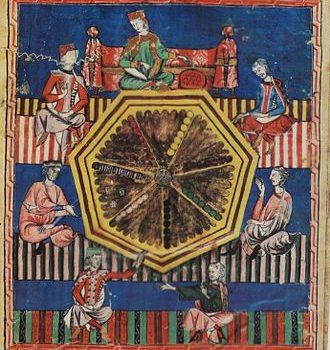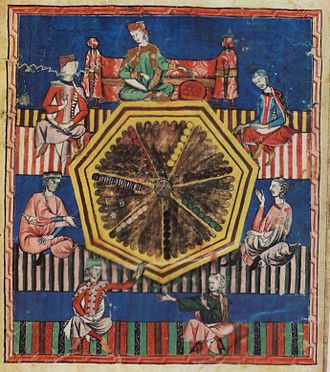Kept safely within one of the most beautiful old libraries in Spain is an amazing 1283 CE illuminated manuscript which quietly holds exceptional wisdom for one’s life. This insightful book is a compilation of games known in the thirteenth century and is entitled the Libro de los Juegos (Book of Games). It was commissioned by Alfonso X (1221-1284) during his reign as King of Castile and currently rests inside the magnificent Escorial.
Alfonso X had a passion for discovering and encouraging the pursuit of knowledge. His devotion towards study not only earned him the nickname ‘Alfonso the Wise’, but it inspired him to form the Toledo School of Translators. It was through this group of diverse people (Jewish, Christian and Muslim scholars) that Alfonso X authorized translations and the production of numerous works and shared them within his court. The Book of Games was one of these prized pieces.
Upon first thought, a book describing the playing of games might seem to hold nothing more than a look into a man’s leisurely activities. However, cleverly communicated within the Book of Games, timeless wisdom is offered. Presented within the book’s 97 pages of detailed accounts, instructions, and illustrations of games, and their layout, a valuable direction for living life to its fullest can be discerned.
The opening pages share the manuscript’s belief that games were created so man could have complete happiness, as God intended; that through their play man finds relief from troubles and is able to learn lessons to better prepare him for what the future holds. Games were held in esteem for the contentment and knowledge they provided.
A brief passage from the Book of Games (while giving details about the game of chess and the movement of its king game-piece) demonstrates this clearly. It offers how a game’s play can pleasingly represent actions and reveal consequences for taking either the right or wrong action:
The movement of the pieces was established for this reason that we will tell you, because just as the king should not rush into battles, but go very slowly and gaining always from the enemies and fighting so as to beat them, likewise the king of the chessmen is not to move more than one square straight or diagonally, as one who looks all around him meditating on what he is to do.
But one of the most all-encompassing examples of wisdom from games, found within this valuable tome, comes from a story about three wise men and a king who asked them a question about life. The enlightening account is shared in the introduction and proposes a compelling way for living life. It relates the reasons why the three types of game (chess, dice and tables) were originally invented and reveals the reason for the page ordering of the games contained in the book.
Written in the old manuscript, the tale begins with the ancient King of India, who wondered which was greater to have in life, skill or luck; a question we may have all asked ourselves. Calling upon his three wise men, he asked each of them for an answer: one said it was skill; a second said it was luck; the third said a man needs both.
The king decided to send his wise men off to search for proof of their opinions. When they returned, each carried a game.
The first wise man, who had said it was better to have skill, offered the game of chess to prove his point. He showed that a player beats his opponent through being the most perceptive and skilful. Luck plays no part in winning the game, and therefore skill is more important to have in life.
The second wise man, who felt luck was most important, brought forth the game of dice. He showed that no matter how skilful or intelligent a player may be, if his lot in life is against him, he has not a choice in the matter. So, it would be best to have luck.
The third wise man, who had said man needed both skill and luck, demonstrated a game which contained both skill and chance. This game was called tables (backgammon), and the wise man proved that a player, even if the rolls were against him, could overcome the obstacles and win the game if he had obtained the knowledge to do so.
The account of these three different types of game delivers the reasons for why the games were created. They provide man with a powerful insight into life. In reality, life involves both skill and luck. A person playing the game of chess realizes the value of knowledge and, while playing the game of dice, he realizes he cannot always control all that happens. Playing the game of tables, the understanding of a man who seeks wisdom and knowledge, and is better prepared to balance the lots in life, is realized.
I believe this awareness is also conveyed by the arrangement in which the games are discussed in the manuscript. Alfonso X ordered the games by placing chess first, dice second and tables third. Resembling life, it would seem the order suggests that a man should search and acquire knowledge in order to overcome the hardships which are sure to come. Discovering the balance of skill and chance is one of the main objectives for life. This wisdom, imparted by the three wise men so long, long ago, continues to hold true.
Interestingly, the Book of Games includes a final section of games following these initial three. Astrological and astronomical games are presented and are explicitly stated to be for ‘learned men’. It is assumed that these games hold deeper, higher understandings which can only be understood once the ‘basics’ are known. Playing games, like living life, seems to keep continuing on all levels.
I love researching games and learning about the secrets they hold. I am always amazed at what they have to offer and continue to explore the wonderful perspectives they express. It is a fascinating journey!


